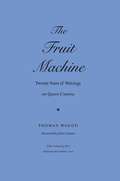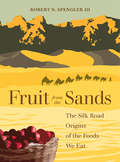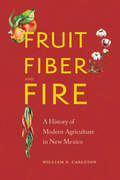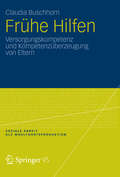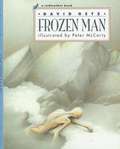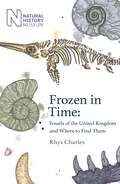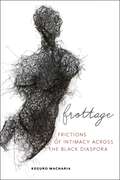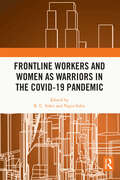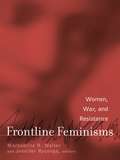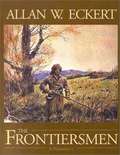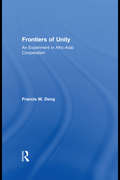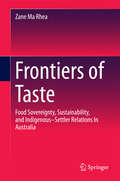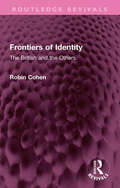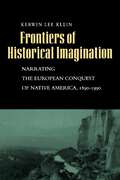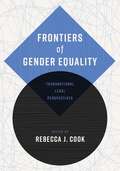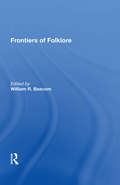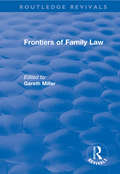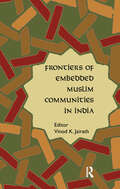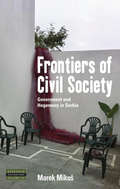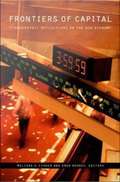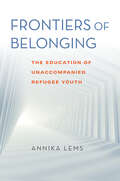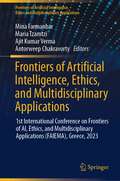- Table View
- List View
The Fruit Machine: Twenty Years of Writings on Queer Cinema
by John Greyson Thomas WaughFor more than twenty years, film critic, teacher, activist, and fan Thomas Waugh has been writing about queer movies. As a member of the Jump Cut collective and contributor to the Toronto-based gay newspaper the Body Politic, he emerged in the late 1970s as a pioneer in gay film theory and criticism, and over the next two decades solidified his reputation as one of the most important and influential gay film critics. The Fruit Machine--a collection of Waugh's reviews and articles originally published in gay community tabloids, academic journals, and anthologies--charts the emergence and maturation of Waugh's critical sensibilities while lending an important historical perspective to the growth of film theory and criticism as well as queer moviemaking. In this wide-ranging anthology Waugh touches on some of the great films of the gay canon, from Taxi zum Klo to Kiss of the Spider Woman. He also discusses obscure guilty pleasures like Born a Man . . . Let Me Die a Woman, unexpectedly rich movies like Porky's and Caligula, filmmakers such as Fassbinder and Eisenstein, and film personalities from Montgomery Clift to Patty Duke. Emerging from the gay liberation movement of the 1970s, Waugh traverses crises from censorship to AIDS, tackling mainstream potboilers along with art movies, documentaries, and avant-garde erotic videos. In these personal perspectives on the evolving cinematic landscape, his words oscillate from anger and passion to wry wit and irony. With fifty-nine rare film stills and personal photographs and an introduction by celebrated gay filmmaker John Greyson, this volume demonstrates that the movie camera has been the fruit machine par excellence.
Fruit from the Sands: The Silk Road Origins of the Foods We Eat
by Robert N. Spengler IIIThe foods we eat have a deep and often surprising past. From almonds and apples to tea and rice, many foods that we consume today have histories that can be traced out of prehistoric Central Asia along the tracks of the Silk Road to kitchens in Europe, America, China, and elsewhere in East Asia. The exchange of goods, ideas, cultural practices, and genes along these ancient routes extends back five thousand years, and organized trade along the Silk Road dates to at least Han Dynasty China in the second century BC. Balancing a broad array of archaeological, botanical, and historical evidence, Fruit from the Sands presents the fascinating story of the origins and spread of agriculture across Inner Asia and into Europe and East Asia. Through the preserved remains of plants found in archaeological sites, Robert N. Spengler III identifies the regions where our most familiar crops were domesticated and follows their routes as people carried them around the world. With vivid examples, Fruit from the Sands explores how the foods we eat have shaped the course of human history and transformed cuisines all over the globe.
Fruit, Fiber, and Fire: A History of Modern Agriculture in New Mexico
by William R. CarletonFor much of the twentieth century, modernization did not simply radiate from cities into the hinterlands; rather, the broad project of modernity, and resistance to it, has often originated in farm fields, at agricultural festivals, and in agrarian stories. In New Mexico no crops have defined the people and their landscape in the industrial era more than apples, cotton, and chiles. In Fruit, Fiber, and Fire William R. Carleton explores the industrialization of apples, cotton, and chiles to show how agriculture has affected the culture of twentieth-century New Mexico. The physical origins, the shifting cultural meanings, and the environmental and market requirements of these three iconic plants all broadly point to the convergence in New Mexico of larger regions—the Mexican North, the American Northeast, and the American South—and the convergence of diverse regional attitudes toward industry in agriculture. Through the local stories that represent lives filled with meaningful struggles, lessons, and successes, along with the systems of knowledge in our recent agricultural past, Carleton provides a history of the broader culture of farmers and farmworkers. In the process, seemingly mere marginalia—a farmworker&’s meal, a small orchard&’s advertisement campaign, or a long-gone chile seed—add up to an agricultural past with diverse cultural influences, many possible futures, and competing visions of how to feed and clothe ourselves that remain relevant as we continue to reimagine the crops of our future.
Frühe Hilfen
by Claudia BuschhornUntersuchungen zur Wirksamkeit der vielfältigen Angebote Früher Hilfen, verstanden als Bildungs-, Beratungs- und Unterstützungsangebote zur Förderung der elterlichen Beziehungs-, Erziehungs- und Versorgungskompetenz von (werdenden) Eltern, gibt es derzeit kaum. Claudia Buschhorn stellt eine angebotsübergreifende, wirkungsorientierte Analyse von Frühen Hilfen vor. Anhand einer telefonischen Befragung von AdressatInnen, die Frühe Hilfen besuchten, wurden Daten erhoben, die Aussagen darüber erlauben, inwiefern sich die Versorgungskompetenz sowie die elterliche Kompetenzüberzeugung verändern. Die Auswertungen zeigen positive Effekte der Angebote bei einer hohen subjektiven Zufriedenheit der AdressatInnen und liefern damit wichtige Impulse für die Diskussion um die Wirksamkeit Früher Hilfen.
The Frozen Man
by David Getz Peter Mccarty"Getz explains the incredible story of the Iceman clearly and concisely, simply enough for a child to understand but in enough depth to satisfy a curious lay adult. " - Kirkus Reviews
Frozen in Time: Fossils of the United Kingdom and Where to Find Them
by Rhys CharlesA vibrant and richly detailed guide to fossils for readers with a passion for the natural world and those that inhabited it long ago.This is a book for those that want to learn to scan the beach for fossils, who love the simple pleasure of getting outside or those who want to develop their relationship with the world around them. From the Jurassic Coast to the Antrim Coast, our nation is home to some of the most incredible fossil sites in the world.Weaving an intricate tapestry of knowledge on the landscape of our own pre-historic planet, palaeontologist and Education Officer of the Bristol Dinosaur Project, Rhys Charles beautifully communicates the joy of fossil-hunting and where best to hunt for them in the country. Under his guidance, and with The Natural History Museum, this book invites readers to unlock breath-taking fragments of a lost world.
Frozen in Time: Fossils of the United Kingdom and Where to Find Them
by Rhys CharlesA vibrant and richly detailed guide to fossils for readers with a passion for the natural world and those that inhabited it long ago.This is a book for those that want to learn to scan the beach for fossils, who love the simple pleasure of getting outside or those who want to develop their relationship with the world around them. From the Jurassic Coast to the Antrim Coast, our nation is home to some of the most incredible fossil sites in the world.Weaving an intricate tapestry of knowledge on the landscape of our own pre-historic planet, palaeontologist and Education Officer of the Bristol Dinosaur Project, Rhys Charles beautifully communicates the joy of fossil-hunting and where best to hunt for them in the country. Under his guidance, and with The Natural History Museum, this book invites readers to unlock breath-taking fragments of a lost world.
Frottage: Frictions of Intimacy across the Black Diaspora (Sexual Cultures #11)
by Keguro MachariaA new understanding of freedom in the black diaspora grounded in the erotic In Frottage, Keguro Macharia weaves together histories and theories of blackness and sexuality to generate a fundamentally new understanding of both the black diaspora and queer studies. Macharia maintains that to reach this understanding, we must start from the black diaspora, which requires re-thinking not only the historical and theoretical utility of identity categories such as gay, lesbian, and bisexual, but also more foundational categories such as normative and non-normative, human and non-human. Simultaneously, Frottage questions the heteronormative tropes through which the black diaspora has been imagined. Between Frantz Fanon, René Maran, Jomo Kenyatta, and Claude McKay, Macharia moves through genres—psychoanalysis, fiction, anthropology, poetry—as well as regional geohistories across Africa and Afro-diaspora to map the centrality of sex, gender, desire, and eroticism to black freedom struggles. In lyrical, meditative prose, Macharia invigorates frottage as both metaphor and method with which to rethink diaspora by reading, and reading against, discomfort, vulnerability, and pleasure.
Frontline Workers and Women as Warriors in the Covid-19 Pandemic
by R. C. Sobti Vipin SobtiThe Covid-19 Pandemic disrupted lives across borders and created unprecedented pressures on the health and medical infrastructure. Frontline workers were at the forefront in handling efforts to curb its devastating effects on people’s lives. This volume looks at various challenges frontline workers and women, working tirelessly both in the privacy of homes as well as professionals in public spaces faced and their immense contribution to managing the pandemic. It examines the psycho-social and health implications the pandemic and its fallout has had on the professions and personal lives of healthcare workers, sanitary workers, police, teachers, household helps, sex workers, volunteers among others. Analysing the vulnerabilities and the adaptability of nursing personnel, doctors and administrators, it also offers suggestions for rebooting health-care systems and for putting in place support-systems to mitigate the adverse gendered impacts of the lockdowns and the spread of the disease. Comprehensive and insightful, with essays from experts in different fields, this book will be of interest to students and researchers of public health, health care management, gender studies, public policy making, sociology, economics.
Frontline Feminisms: Women, War, and Resistance (Gender, Culture and Global Politics)
by Jennifer Rycenga Marguerite R. WallerFirst published in 2001. Routledge is an imprint of Taylor & Francis, an informa company.
The Frontiersmen
by Allan W. EckertThe frontiersmen were a remarkable breed of men. They were often rough and illiterate, sometimes brutal and vicious, often seeking an escape in the wilderness of mid-America from crimes committed back east. In the beautiful but deadly country which would one day come to be known as West Virginia, Kentucky, Michigan, Ohio, Indiana, and Illinois, more often than not they left their bones to bleach beside forest paths or on the banks of the Ohio River, victims of Indians who claimed the vast virgin territory and strove to turn back the growing tide of whites. These frontiersmen are the subjects of Allan Eckert's dramatic history. Against the background of such names as George Rogers Clark, Daniel Boone, Arthur St. Clair, Anthony Wayne, Simon Girty and William Henry Harrison, Eckert has recreated the life of one of America's most outstanding heroes, Simon Kenton. Kenton's role in opening the Northwest Territory to settlement more than rivaled that of his friend Daniel Boone. By his eighteenth birthday, Kenton had already won frontier renown as woodsman, fighter and scout. His incredible physical strength and endurance, his great dignity and innate kindness made him the ideal prototype of the frontier hero. Yet there is another story to The Frontiersmen. It is equally the story of one of history's greatest leaders, whose misfortune was to be born to a doomed cause and a dying race. Tecumseh, the brilliant Shawnee chief, welded together by the sheer force of his intellect and charisma an incredible Indian confederacy that came desperately close to breaking the thrust of the white man's westward expansion. Like Kenton, Tecumseh was the paragon of his people's virtues, and the story of hislife, in Allan Eckert's hands, reveals most profoundly the grandeur and the tragedy of the American Indian. No less importantly, The Frontiersmen is the story of wilderness America itself, its penetration and settlement, and it is Eckert's particular grace to be able t
Frontiers Of Unity: An Experiment in Afro-Arab Cooperation
by Francis DengThis book deals with the conflict between Northern and Southern Sudan over the Abeyi region and other border areas. This area has historically been a model of peaceful coexistence and cooperation but since its independence it has become a point of violent confrontation. Frontiers of Unity provides an essential background to the complexities of the conflict, looking at the factors behind it and calling for the resolution of Africa’s longest running dispute. First written in 1972, after the agreement that ended the war in Sudan, the original text has been supplemented by additions and modifications to update its relevance to the current situation in Southern Sudan. In 1983, the continuing dispute in Abyei led to the resumption of hostilities and the eventual escalation into a full-fledged armed struggle under the leadership of the SPLM/A, which continues today. Without resolving the cause of Abyei and the other border areas of the Nuba and Southern Blue Nile, no sustainable peace between the North and South is possible. This important historical document will be of great relevance to scholars of African-Arab relations, conflict and peace studies and nation building.
Frontiers of Taste
by Zane Ma RheaThis book provides a critical, multiperspective, sociohistorical analysis of the role of food in postcolonial Indigenous, British and French settler relations. Drawing on archival resources from Australian explorers, settlers and nation builders, the book argues that contemporary issues of food security, sovereignty and sustainability have been significantly shaped by the colonial impact on human foodways. The author goes on to enhance readers' understanding of how contact between inhabitants and newcomers was shaped and informed by food, and how these engagements established a modus vivendi that carries through to the present day. Based on the assessment of archival records, it uses a comparative, socio-historical lens to investigate contact between Indigenous and non-Indigenous people where the exchange of food or knowledge about food took place. It finds that the transfer of food and food knowledge was multifaceted, and the flow of food knowledge occurred in both directions, although these exchanges were neither symmetrical nor balanced. It also analyzes and discusses food as a focal point of activity. The final chapter offers an assessment of the potential for the development of a sustainable, nutritious, tasty Australian cuisine that moves beyond the tropes and stereotypical narratives embedded into colonial Indigenous-settler relations in the context of food. If this was accepted by all Australians, it would allow opportunities to be created for Indigenous Australians to develop food products for the market that are sustainable, economically viable and developed in ways that are culturally appropriate.
Frontiers of Identity: The British and the Others (Routledge Revivals)
by Robin CohenOriginally published in 1994, this book considers one of the enduring themes of social science. How is a national identity forged and sustained? How does it change over time? Who is included in the body politic and who is socially excluded? How do the established population, opinion-makers and politicians react to more marginal people, including long-spurned minorities and recent migrants?This original analysis shows how the British as a people are constantly defined and redefined through their interactions with several ‘frontiers of identity’, namely Celts, expatriates, Americans, Europeans, citizens of the Commonwealth and more crucially with ‘aliens’. The alien-British relationship is particularly loaded with uneasiness, aversion and hostility. ‘Aliens’ a category created by what the author calls ‘the frontier guards’ of British identity, are frequently deported or detained. Their sanctuaries are invaded, their legal and humanitarian claims for asylum minutely examined and often denied. This searching exploration of these processes shows how the meaning of who one is depends crucially on who one rejects.Drawing on a wealth of historical scholarship, research compiled at the time of the original publication and contemporary social theory and now reissued with a new Preface this book exposes the unstated assumptions and hidden meanings in the relationship between the ‘British’ and ‘the others'. It uncovers how the British and their rulers seek to reshape their national identity in a difficult period of post-imperial adjustment, relative economic decline and the European integration of the 1990s.The book will be of use to students of sociology, politics, history and European studies.
Frontiers of ICT in Healthcare: Proceedings of EAIT 2022 (Lecture Notes in Networks and Systems #519)
by Jyotsna Kumar Mandal Debashis DeThe book includes original unpublished contributions presented at the Seventh International Conference on Emerging Applications of Information Technology (EAIT 2022), organized by Computer Society of India, Kolkata, Chapter during March 30–31, 2022. The book covers the topics such as image processing for smart healthcare applications, computer vision and pattern recognition for health care, Internet of Health Things, 5G and beyond in smart health care for sustainable cities.
Frontiers of Historical Imagination: Narrating the European Conquest of Native America, 1890-1990
by Kerwin Lee KleinThe American frontier, a potent symbol since Europeans first stepped ashore on North America, serves as the touchstone for Kerwin Klein's analysis of the narrating of history. Klein explores the traditions through which historians, philosophers, anthropologists, and literary critics have understood the story of America's origin and the way those understandings have shaped and been shaped by changing conceptions of history. The American West was once the frontier space where migrating Europe collided with Native America, where the historical civilizations of the Old World met the nonhistorical wilds of the New. It was not only the cultural combat zone where American democracy was forged but also the ragged edge of History itself, where historical and nonhistorical defied and defined each other. Klein maintains that the idea of a collision between people with and without history still dominates public memory. But the collision, he believes, resounds even more powerfully in the historical imagination, which creates conflicts between narration and knowledge and carries them into the language used to describe the American frontier. In Klein's words, "We remain obscurely entangled in philosophies of history we no longer profess, and the very idea of 'America' balances on history's shifting frontiers."
Frontiers of Gender Equality: Transnational Legal Perspectives (Pennsylvania Studies in Human Rights)
by Rebecca J. CookIn Frontiers of Gender Equality, editor Rebecca Cook enlarges the chorus of voices to introduce new and different discourses about the wrongs of gender discrimination and to explain the multiple dimensions of gender equality. This volume demonstrates that the wrongs of discrimination can best be understood from the perspective of the discriminated, and that gender discrimination persists and grows in new and different contexts, widening the gap between the principle of gender equality and its realization, particularly for subgroups of women and LGBTQ+ peoples.Frontiers of Gender Equality provides retrospective views of the struggles to eliminate gender discrimination in national courts and international human rights treaties. Focusing on gender equality enables comparisons and contrasts among these regimes to better understand how they reinforce gender equality norms. Different regional and international treaties are examined, those in the forefront of advancing gender equality, those that are promising but little known, and those whose focus includes economic, social, and cultural rights, to explore why some struggles were successful and others less so. The book illustrates how gender discrimination continues to be normalized and camouflaged, and how it intersects with other axes of subordination, such as indigeneity, religion, and poverty, to create new forms of intersectional discrimination.With the benefit of hindsight, the book’s contributors reconstruct gender equalities in concrete situations. Given the increasingly porous exchanges between domestic and international law, various national, regional, and international decisions and texts are examined to determine how better to breathe life into equality from the perspectives, for instance, of Indigenous and Muslim women, those who were violated sexually and physically, and those needing access to necessary health care, including abortion. The conclusion suggests areas of future research, including how to translate the concept of intersectionality into normative and institutional settings, which will assist in promoting the goals of gender equality.
Frontiers Of Folklore/h
by William R BascomFrontiers of Folklore explores some of the avenues of research that are exciting young folklorists today. In the introduction, William Bascom reviews briefly the development of folklore theories and suggests three frontiers of folklore that remain to he explored. Alan Bundes asks the question? "Who are the folk? Pointing out that folklore exists
Frontiers of Family Law
by Gareth MillerThis title was first published in 2003. The essays in this collection are written by academics and practitioners who look at some of the key aspects of family law. Papers include one from Lord Justice Ward, who gave the first judgement in the Court of Appeal on the case of the conjoined twins from Malta, another from Judge Pearl who has been responsible for training the judiciary on the impact of the Human Rights Act on family law, while Dr C. Ball contributes a paper on aspects of the 1989 Children Act. Parent and child contact across borders is dealt with in a paper by William Duncan, who is Deputy Director General of the Hague Conference. Other topics include medical evidence in child cases, pre-nuptial agreements and the re-establishing of contact after divorce.
Frontiers of Embedded Muslim Communities in India
by Vinod K. JairathThis volume approaches the study of Muslim societies through an evolutionary lens, challenging Islamic traditions, identities, communities, beliefs, practices and ideologies as static, frozen or unchangeable. It assumes that there is neither a monolithic, essential or authentic Islam, nor a homogeneous Muslim community. Similarly, there are no fixed binary oppositions such as between the ulama and sufi saints or textual and lived Islam. The overarching perspective — that there is no fixity in the meanings of Islamic symbols and that the language of Islam can be used by individuals, organizations, movements and political parties variously in religious and non-religious contexts — underlies the ethnographically rich essays that comprise this volume. Divided in three parts, the volume cumulatively presents an initial framework for the study of Muslim communities in India embedded in different regional and local contexts. The first part focuses on ethnographies of three Muslim communities (Kuchchhi Jatt, Irani Shia and Sidis) and their relationships with others, with shifting borders and frontiers; part two examines the issue of ‘caste’ of certain Muslim communities; and the third part, containing chapters on Tamil Nadu, Andhra Pradesh, Mumbai and Gujarat, looks at the varied responses of Muslims as Indian citizens in regional contexts at different historical moments. Although the volume focuses on Muslim communities in India, it is also meant to bridge an important gap in, and contribute to, the ‘sociology of India’ which has been organized and taught primarily as a sociology of Hindu society. The book will appeal to those in sociology, history, political science, education, modern South Asian Studies, and to the general reader interested in India & South Asia.
Frontiers of Civil Society: Government and Hegemony in Serbia (Dislocations #22)
by Marek MikušIn Serbia, as elsewhere in postsocialist Europe, the rise of “civil society” was expected to support a smooth transformation to Western models of liberal democracy and capitalism. More than twenty years after the Yugoslav wars, these expectations appear largely unmet. <P><P>Frontiers of Civil Society asks why, exploring the roles of multiple civil society forces in a set of government “reforms” of society and individuals in the early 2010s, and examining them in the broader context of social struggles over neoliberal restructuring and transnational integration.
Frontiers of Capital: Ethnographic Reflections on the New Economy
by Melissa S. Fisher Greg DowneyWith the NASDAQ having lost 70 percent of its value, the giddy, optimistic belief in perpetual growth that accompanied the economic boom of the 1990s had fizzled by 2002. Yet the advances in information and communication technology, management and production techniques, and global integration that spurred the "New Economy" of the 1990s had triggered profound and lasting changes. Frontiers of Capital brings together ethnographies exploring how cultural practices and social relations have been altered by the radical economic and technological innovations of the New Economy. The contributors, most of whom are anthropologists, investigate changes in the practices and interactions of futures traders, Chinese entrepreneurs, residents of French housing projects, women working on Wall Street, cable television programmers, and others. Some contributors highlight how expedited flows of information allow business professionals to develop new knowledge practices. They analyze dynamics ranging from the decision-making processes of the Federal Reserve Board to the legal maneuvering necessary to buttress a nascent Japanese market in over-the-counter derivatives. Others focus on the social consequences of globalization and new modes of communication, evaluating the introduction of new information technologies into African communities and the collaborative practices of open-source computer programmers. Together the essays suggest that social relations, rather than becoming less relevant in the high-tech age, have become more important than ever. This finding dovetails with the thinking of many corporations, which increasingly employ anthropologists to study and explain the "local" cultural practices of their own workers and consumers. Frontiers of Capital signals the wide-ranging role of anthropology in explaining the social and cultural contours of the New Economy. Contributors. Jean Comaroff, John L. Comaroff, Greg Downey, Melissa S. Fisher, Douglas R. Holmes, George E. Marcus, Siobhn O'Mahony, Aihwa Ong, Annelise Riles, Saskia Sassen, Paul A. Silverstein, AbdouMaliq Simone, Neil Smith, Caitlin Zaloom
Frontiers of Belonging: The Education of Unaccompanied Refugee Youth (Worlds in Crisis: Refugees, Asylum, and Forced Migration)
by Annika LemsAs unprecedented numbers of unaccompanied African minors requested asylum in Europe in 2015, Annika Lems witnessed a peculiar dynamic: despite inclusionary language in official policy and broader society, these children faced a deluge of exclusionary practices in the classroom and beyond. Frontiers of Belonging traces the educational paths of refugee youth arriving in Switzerland amid the shifting sociopolitical terrain of the refugee crisis and the underlying hierarchies of deservingness. Lems reveals how these minors sought protection and support, especially in educational settings, but were instead treated as threats to the economic and cultural integrity of Switzerland. Each chapter highlights a specific child's story—Jamila, Meron, Samuel, and more—as they found themselves left out, while on paper being allowed "in." The result is a highly ambiguous social reality for young refugees, resulting in stressful, existential balancing acts. A captivating ethnography, Frontiers of Belonging allows readers into the Swiss classrooms where unspoken distinctions between self and other, guest and host, refugee and resident, were formed, policed, and challenged.
Frontiers of Artificial Intelligence, Ethics, and Multidisciplinary Applications: 1st International Conference on Frontiers of AI, Ethics, and Multidisciplinary Applications (FAIEMA), Greece, 2023 (Frontiers of Artificial Intelligence, Ethics and Multidisciplinary Applications)
by Mina Farmanbar Maria Tzamtzi Ajit Kumar Verma Antorweep ChakravortyThis groundbreaking proceedings volume explores the integration of Artificial Intelligence (AI) across key domains—healthcare, finance, education, robotics, industrial and other engineering applications —unveiling its transformative potential and practical implications. With a multidisciplinary lens, it transcends technical aspects, fostering a comprehensive understanding while bridging theory and practice. Approaching the subject matter with depth, the book combines theoretical foundations with real-world case studies, empowering researchers, professionals, and enthusiasts with the knowledge and tools to effectively harness AI. Encompassing diverse AI topics—machine learning, natural language processing, computer vision, data analytics and supervisory control — the volume showcases state-of-the-art techniques propelling AI advancements. Structured into four parts: Part 1: Artificial Intelligence (AI), explores evolving deep neural networks, reinforcement learning, and explainable AI, providing a deep dive into the technical foundations of AI advancements. Part 2: Robotics and Control Systems, delves into the integration of AI in robotics and automatic control, addressing supervisory control, automated robotic movement coordination, anomaly detection, dynamic programming, and fault tolerance, offering insights into the evolving landscape of intelligent automation. Part 3: AI and Society, examines the societal impact of AI through chapters on ethical considerations, economic growth, environmental engagements, and hazard management, providing a holistic perspective on AI's role in shaping society. Part 4: PhD Symposium, presents the future of AI through cutting-edge research, covering legal and ethical dimensions, privacy considerations, and computationally efficient solutions, offering a glimpse into the next generation of AI advancements. Catering to a diverse audience—from industry leaders to students—the volume consolidates the expertise of renowned professionals, serving as a comprehensive resource for navigating the ever-evolving AI landscape. An essential reference for those staying at the forefront of AI developments.
